|
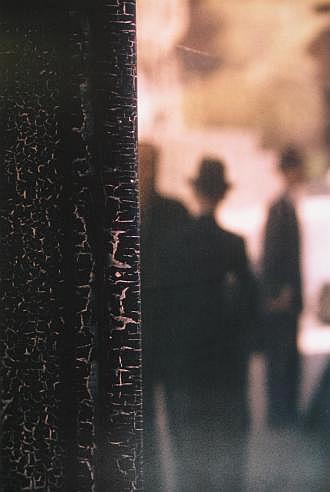
Cracks
1957
Saul Leiter
Jackson Fine Art
Postscript: Saul Leiter (1923-2013)
Teju Cole
_______________________
Draft 112: Verge
Rachel Blau DuPlessis
(....)
Sizes, wires, assizes in the site, other boundaries on this border. Maps and lines are drawn over bodies. Where did “history” put this place? Why did it not “stay there”? What about “them”? Should they live here, or are they basically foreign? What are the facts about myself? What is my where? It’s true that once there was an ending. It seemed as if this were what I had wanted. Why did it then open? I hardly can remember, but then it’s suddenly vivid, though even my own stories have veered over time. Another time pulses through the stifled civic membrane.
...(more)
_______________________
Decisions, decisions: the fate of virtual literature
Teemu Manninen
Books from Finland
(....)
Now that we really do have this always-on connectivity, you will indeed be available every waking hour: you will update your status, check your inbox, post pics and be available for chatting, texting, a quick email and a message or two, just to make sure no one is offended by your unreachability, since – from experience – a week’s worth of not tweeting or facebooking can make someone think that something serious has happened, or that you don’t even exist anymore.
Exhausting, I know. It’s no wonder some of us might feel overwhelmed, unable to choose what to do with our new-found freedom to not just consume information but to produce more and more of it. They call it decision fatigue: the loss of willpower after making too many choices in an environment that presents us with too many of them. Willpower is a muscle, and it can get very tired in this day and age.
What social media and its drive towards constantly sharing what we are reading, seeing, thinking about, feeling, eating and drinking has done is to make us all producers of content: all of us are now storytellers, and the story is ourselves.
Except that the story is happening in realtime, before we or anyone else has had time to evaluate its particulars, to reflect on the experience as a whole, because everything has to be ‘liveblogged’ immediately in snippets of text and image which are reducing the representation of identity down to forms which cannot capture life’s transcendent nuances and are only good at recording or manipulating its immanent surfaces.
This situation, I sometimes feel, is detrimental to the presence of other kinds of storytelling formats on the internet, such as literary journals, and indeed literary culture as a whole.
...(more)
_______________________

Marija Leite
the teller of tales
and scribe
Oskar Loorits
Photo by: Lauri Kettunen
Photographs of Liv Villages
1902-1927
The National Board of Antiquities
Finland
_______________________
from Death and the Dervish
Meša Selimovic
(translated by Lazar Pascanovic)
presented at flowerville
(....)
I felt as if there wasn’t a single thought in me, as if all my senses were numb from a stroke. But, oddly enough, I was aware of everything, more sensitive and susceptible to everything that was surrounding me. The ear could catch the tinkling sounds of the night, clear and purified, as if they were echoing, bouncing off the glass. I could discern every single sound and yet they all flowed into the joint humming of water, birds, light wind, distant lost voices, and the quiet buzzing of the night that lazily bends under the strikes of the invisible wings. And none of this bothered me nor upset me, I wanted there to be more such voices, hums, buzzing, fluttering, more everything, outside me. Maybe I was hearing so clearly in order not to listen to myself.
It was probably the only time in my life that voices and hums, light and shapes, emerged as what they were, as a sound, a murmur, a smell, a shape, a sign and declaration of things outside myself, for I was listening and watching, separated, uninvolved, without either sorrow or mirth, neither ruining nor improving. They were living alone, without my partaking, unchanged by my feelings. And so independent was I, true, unassimilated into my thought about them, like a foreign, unrecognized thing, something that goes on, that happens past everything, vain and futile. I switched out, and I was disconnected, separated from everything around me, and the world was filled with ghosts, alive but indifferent. And I was free and impenetrable.
...(more)
_______________________
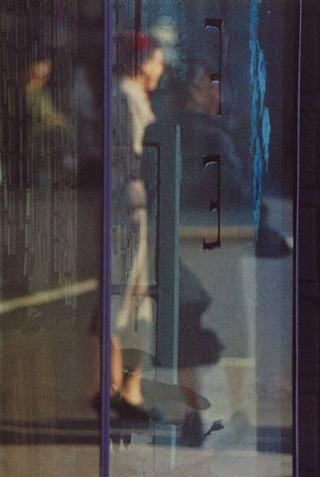
Walking
Saul Leiter
1956
_______________________
“Democratic” Psychiatry
Arran James
The Occupied Times
When I hear the phrase “democratic psychiatry” I immediately think of the rhetoric of “service user involvement” and the ideology of empowerment. These aren’t the directions psychiatry should take simply because this is the direction psychiatry is already taking and which it is already perfectly able to assimilate. I am opposed to this rhetoric and ideology not because I think they will be the ruin of psychiatry as it exists, but because I am convinced that they will not.
...(more)
_______________________
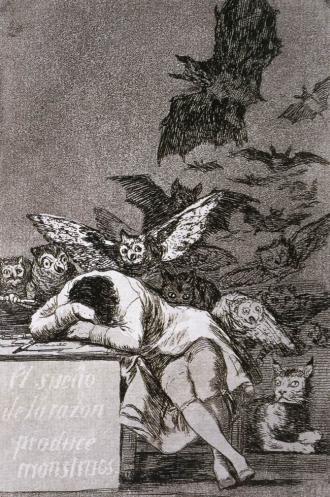
The sleep of reason produces monsters
1797 - 1798
Goya
.....................................................
5 Poems
Jerome Rothenberg
alligatorzineThe Sleep Of Reason
for Clayton Eshleman
Words imprinted on a sign
by Goya
glowing
white against a surface
nearly white:
the sleep of reason
that produces monsters.
He is sitting on a chair
his head slumped
resting on his arms
or on the marble table,
pencil set aside,
his night coat open
thighs exposed.
All things that fly at night
fly past him.
Wings that brush an ear,
an ear concealed,
a memory beginning
in the house of sleep.
His is a world where owls
live in palm trees,
where a shadow in the sky
is like a magpie,
white & black are colors
only in the mind,
the cat you didn’t murder
springs to life,
a whistle whirling in a cup,
gone & foregone,
a chasm bright with eyes.
There is a cave in Spain,
a fecal underworld,
where bats are swarming
among bulls,
the blackness ending in a wall
his hands rub up against,
a blind man in a painted world,
amok & monstrous
banging on a rock.
[From "50 Caprichos after Goya" in Concealments & Caprichos, Black Widow Press, 2010]
...(more)
_______________________
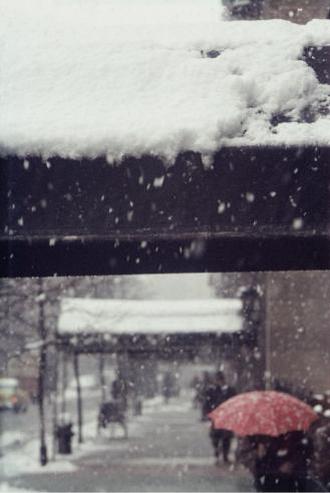
Park Avenue
Saul Leiter
c. 1955

"The Conquest of the Air"
1913
Roger de La Fresnaye
d. November 27, 1925
_______________________
Man vs. Corpse
Zadie Smith
(....)
Talking about him over dinner—like groupies discussing their favorite band—I discovered that although most people felt as strongly about their time spent under Karl Ove’s skin as I had, we had a dissenter. An objection on the principle of boredom, which you sense Knausgaard himself would not deny. Like Warhol, he makes no attempt to be interesting. But it’s not the same kind of boredom Warhol celebrated, not that clean kind which, as Andy had it, makes “the meaning go away,” leaving you so much “better and emptier.” Knausgaard’s boredom is baroque. It has many elaborations: the boredom of children’s parties, of buying beers, of being married, writing, being oneself, dealing with one’s family. It’s a cathedral of boredom. And when you enter it, it looks a lot like the one you yourself are living in. (Especially true if, like Karl Ove, you happen to be a married writer. Such people are susceptible to the peculiar charms of Karl Ove.) It’s a book that recognizes the banal struggle of our daily lives and yet considers it nothing less than a tragedy that these lives, filled as they are not only with boredom but with fjords and cigarettes and works by Dürer, must all end in total annihilation.
But nothing happens! our dissenter cried. Still, a life filled with practically nothing, if you are fully present in and mindful of it, can be a beautiful struggle. In America we are perhaps more accustomed to art that enacts the boredom of life with a side order of that (by now) overfamiliar Warholian nihilism. I think of the similar-but-different maximalist narratives of the young writer Tao Lin, whose most recent novel, Taipei, is likewise committed to the blow-by-blow recreation of everyday existence. That book—though occasionally unbearable to me as I read it—had, by the time I’d finished it, a cumulative effect, similar to the Knausgaard.
Both exhaustively document a life: you don’t simply “identify” with the character, effectively you “become” them. A narrative claustrophobia is at work, with no distance permitted between reader and protagonist. And if living with Tao Lin’s Paul feels somewhat more relentless than living with Karl Ove, there is an element of geographical and historical luck in play: after all, Karl Ove has the built-in sublimity of fjords to console him, whereas Paul can claim only downtown Manhattan (with excursions to Brooklyn and, briefly, Taipei), the Internet, and a sackload of prescription drugs.
...(more)
_______________________
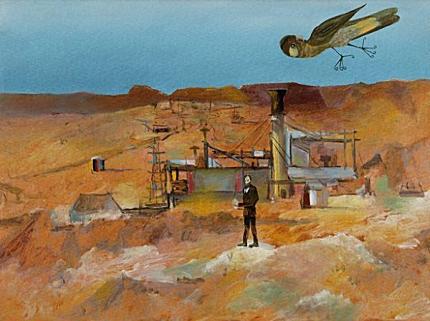
Pretty Polly Mine
Sidney Nolan
_______________________
It is an easy thing to talk of patience to the afflicted,
To speak the laws of prudence to the houseless wanderer,
To listen to the hungry raven's cry in wintry season
When the red blood is fill'd with wine & with the marrow of lambs.
It is an easy thing to laugh at wrathful elements,
To hear the dog howl at the wintry door, the ox in the slaughter house moan;
To see a god on every wind & a blessing on every blast;
To hear sounds of love in the thunder storm that destroys our enemies' house
To rejoice in the blight that covers his field, & the sickness that cuts off his children,
While our olive & vine sing & laugh round our door, & our children bring fruits and flowers.
Then the groan & the dolor are quite forgotten, & the slave grinding at the mill,
And the captive in chains, & the poor in the prison, & the soldier in the field
When the shatter'd bone hath laid him groaning among the happier dead.
It is an easy thing to rejoice in the tents of prosperity:
Thus could I sing and thus rejoice: but it is not so with me.
- William Blake (b. November 28, 1757), from The Four Zoas
_______________________
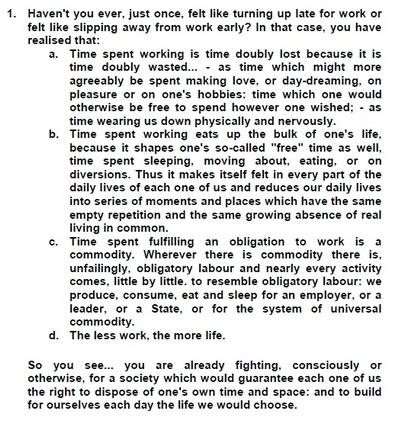
Contributions To the Revolutionary Struggle [pdf]
Intended to be discussed, corrected, and principally, put into practice without delay
Raoul Vaneigem
via Forgottenness
_______________________
Seiobo There Below – László Krasznahorkai
reviewed by Matthew Feig
full-stop
(....)
László Krasznahorkai’s Seiobo There Below also begins with a white heron standing transfixed in the water. But far from a dumbfounded dream, it demonstrates absolute concentration, standing perfectly still for hours until the perfect moment is reached, when it strikes in a flash. As in Yeats, the bird’s hunting ritual is at once transcendent and dangerous — the bird represents a beauty both vulnerable and “unbearable” — and Krasznahorkai, like Yeats, is fascinated by the possibilities and perils of such transcendence through art and ritual. The bird embodies at once the potential of intense observation to give meaning to everything but also the tragedy of beauty wasted on an indifferent or inadequate observer, or lost forever:
. . . .no one is looking, no one sees it, and if it’s not seen today then it is not seen for all eternity, the inexpressible beauty with which it stands shall remain concealed . . . something is lost before it even has a chance to appear, and there shall be no one to bear witness to the recognition that it is the one that gives meaning to everything around it . . . the unyielding artist of this landscape, who . . . as the fulfillment of unswerving artistic observation, rises once and for all above that to which it gives meaning, rises above it . . . above the local meaning permeating everything, as well as above that of its own actual activity, because what is the point of being beautiful, especially when it is just a white bird standing and waiting . . . .
Observation itself is the ritual, which is a neat example for a book about ritual and observation. In Seiobo There Below, we see in disparate examples Krasznahorkai regarding art and artists through the lens of Noh; the very act of making or viewing art becomes a chance to abut the sublime, or to crash into it....(more)
_______________________

Diabolo
Roger de La Fresnaye
c.1914
_______________________
The ancient Poets animated all sensible objects with Gods or Geniuses, calling them by the names and adorning them with the properties of woods, rivers, mountains, lakes, cities, nations, and whatever their enlarged & numerous senses could percieve.
And particularly they studied the genius of each city & country, placing it under its mental deity.
Till a system was formed, which some took advantage of & enslav'd the vulgar by attempting to realize or abstract the mental deities from their objects; thus began Priesthood.
Choosing forms of worship from poetic tales.
And a length they pronounced that the Gods had ordered such things.
Thus men forgot that All deities reside in the human breast.
William Blake, The Marriage of Heaven and Hell
_______________________
Philosophy of Information: An Introduction
Andrew Iliadis
The PI Research Network.
_______________________
First Monday Special issue: Media & the city
How has media affected cities in real, concrete terms? How do “bits” and “waves” become “bricks”? This large special issue, edited by Matteo Tarantino and Simone Tosoni, collects 15 papers by Giorgia Aiello, Thomas Apperley, Joshua Breitbart, Greta Byrum, Roderic N. Crooks, Michiel de Lange, Martijn de Waal, Sophia Drakopoulou, Leopoldina Fortunati, Lee Humphreys, Dale Leorke, Tony Liao, Didem Ozkul, Pietro Palvarini, Cesare Silla, Sakari Taipale, Federica Timeto, Simone Tosi, Shenja van der Graaf, and Wim Vanobberghen, all examining the ever evolving relationship between cities and digital media.
_______________________

Sidney Nolan
d. November 28, 1992
_______________________
Around the pillars of Urthona, and round thy dark limbs,
On the Canadian wilds I fold, feeble my spirit folds.
- William Blake, America: A Prophecy
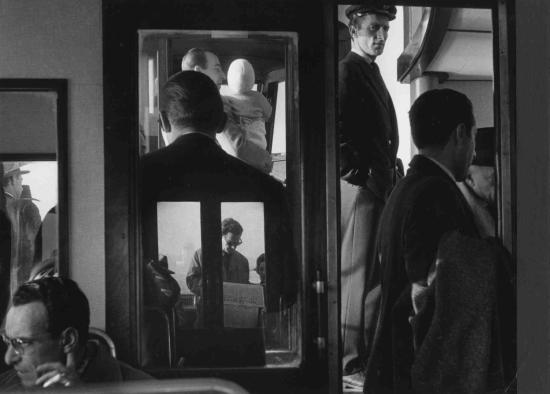
venezia in vaporetto'
Gianni Berengo Gardin
1965
1 2
_______________________
Has the Image Killed the Imagination?
Professor Ben O'Loughlin
Inaugural Lecture
The Department of Politics and International Relations
Royal Holloway University of London
Try to imagine the future. You can’t. You’re reading this. The screen has you trapped. Another image is catching your eye now too. The image is crowding out the future, a continuous drain on attention. Politics is dreams, goals, plans. It needs the future. Without time to imagine, what is left of politics?
Backdoor Broadcasting Company
Academic Podcasts
via —synthetic_zero_______________________
On Poetic Production, "The Embattled Lyric"
and a Topography of Hope
Nathaniel Tarn
alligatorzine
A lecture in the series "History & Forms of Lyric," Poetics Colloquium,
University of Chicago, May 1st, 2012.
(....)
Until some two years ago and ever since I can remember, I was engaged in a search for some sort of ultimate meaning – if you like some kind of “spirituality.” A longstanding interest in esoteric writings of all sorts and in the phenomenon known as initiation; eventually lodged for many years in Mahayana Buddhism, first in Zen, later in the Vajrayana. Then, some two years ago, during a morning walk, I suddenly felt all of that dropping away like some garment no longer required. It has seemed to me since then that all religions, all religious systems and practices, are ultimately brought about by attempts to deal with the universal fear of mortality. With the fear of what I call “the nothingness of nothing” since the word “nothing,” by itself, is incomprehensible. I eventually went as far as to see all established institutional religions – and especially the Abrahamic ones – as nocive when acting within their static, interminable, cultic redundancy and their authoritarianism, no matter how strong their consolatory functions might be. An ultimate pessimism regarding the fate of the human race in the hands of equally authoritarian politico-economic powers made me into what I have come to call a “terminalist.” Not, of course, “Repent, the End of the World is at hand!” but: Given the way in which humanity continues to behave toward itself and toward Nature and despite numerous praiseworthy efforts to stem the negative tide, it is more than probable that the human race will do away with itself in an already foreseeable future and, in any event, well before the end of this planet’s existence.
At this point, despite the claims on me of isness, ipseity, immanence; despite the cardinal directive of virtually all secular or profane philosophies – i.e. “lead your life in the moment and nowhere and at no time else,” I continue to find the questions “why? what for?” fundamentally overwhelming. Entertainment left completely behind, the point of producing Hope in the form of poetry seems to withdraw into immeasurable distance and alienation. In plainer words, how and why does a thinking human being continue the activity of hoping when in the absence of all apparent ground for Hope? When, as a poet, one has lived longer in death than in life? When to be a poet as fully as to be a human being is to be in a great many ways already dead? A little later, I’ll be going into the figure of Orpheus as the archetypal poet-visitor from the dead.
...(more)
via The Page
poetry, essays, ideas _______________________
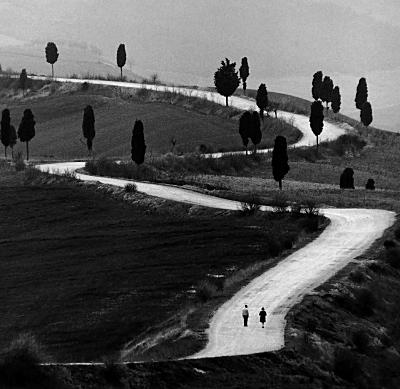
Gianni Berengo Gardin
_______________________
Lydia Davis's Proust: The Writer As Translator, The Translator As Writer
Helane Levine-Keating
3quarksdaily
(....)
... What does it mean, then, to be both a writer and a translator, who in each role is affected by the whims of the marketplace, the need to make a living, and, by extension, the critics who deem a text worthy or unworthy of being bought and read?
It’s fascinating to explore the intertextual and labyrinthine connections between Lydia Davis’s own fiction; her translation of Marcel Proust’s Du côté de chez Swann; her methodology for translating; the critical response to her work by critic, novelist, and memoirist André Aciman; and, finally, her fictional response to that particular criticism. As an award-winning writer of short stories, poems, a novel, and essays, as well as translations, Davis has focused on exploring in her “best stories . . . problems of language, its insufficiencies and irregularities, how lives can be undone—or remade—by a preposition or pronoun. . . . Misunderstandings pivot on the misapplication of an adjective or the absence of one,” as Jason McBride notes in an interview with the author.
I would add that Davis’s fiction also focuses on the inner workings of the mind, the convoluted thought processes we experience, the paradoxes inherent in language and thought. In this way, her concerns can be viewed as similar to those of Proust, for in language and the use of tenses one is inevitably concerned with time, be it lost or found.
...(more)
_______________________
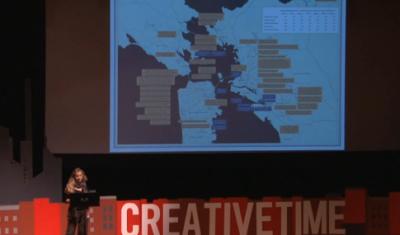
A Thousand Stories in the Naked City
Rebecca Solnit
video
Keynote Presentation
Creative Time Summit
_______________________
'This language materialized'
A review of Mary Burger's 'Then Go On'
Nicole Trigg
jacket2
(....)
Burger’s thoroughness accomplishes an occupation of time and space that yields agency. She starts with nothing, beginning at the beginning — her phonetic protolanguage — and never denies nothing’s constant, in the cracks of contingency to either side of reason or its semblance. “The Man Without Stumps,” for example, foregrounds an absence of legible form. Mid-careen down a crumbling cliff face, the man “notices then that he is not standing on anything, that he is in fact surrounded by nothing … Not just nothing he recognizes, there is nothing at all”. The man is nondescript, bouncy, soft, the terrain sliding and loose. Any form they retain is a turbulent blur. In a strophe on raising tents: “Always at the fulcrum of the lift there is a chance someone will give out. One pole will swerve wildly, others will waver, suddenly the whole sky will lurch to one side and collapse”. No determinate shape or area is reliable, all’s in flux, spanned by “the cloud of being that dispels millions of colors in gray matter, an atomized mist, [that] surrounds us and is chilly, we can’t separate ourselves from it or feel any perspective, we can’t look at it because we are in it”. Burger manages to write in, of, and by this cloud, manifesting not only that form is fluid, but that myriad appearances coexist of a truth that can’t be defined.
...(more)
_______________________
I Like Purple
Mary Burger
Excerpt from Then Go On
for Iris Vitiello, age almost 6
“I like purple,” she says. “I don’t know why.”
She tapes plastic farm animals to a piece of cardboard and calls it a farm. She has colored the cardboard green. We accept her premise.
It wasn’t so hard to understand what we’d done—
create a work in which “being” was always in question—
but the existence of the work defied understanding.
A study on narrative positivism—the novel represents public and private space, violence represents subconscious urges—cannot account for it.
Walk me through the body.
That everything be a playlet—the accordion-playing rabbit, the finely detailed plastic hippo (“West Germany”), the fish vase with the round eye hole and the open mouth, the Indonesian shadow puppet, all enact a drama on the dining room table—and we keep going, as if we knew their parts and could play them.
The truth came out: I did not know how to read.
An ego gets formed, and a vocabulary, which may at first seem easy, even trite, may seem to determine specific ideas, may seem to prevent the transformation of an embroidered peasant shawl into a wriggling hallucination—girls lined up, one row above another, as if in the corridors of a cell block, a bar or scarf floating across their middle, and below the heads of the next row, the bars moved and danced with the girls, and it seemed the whole system might split, but it didn’t.
_______________________
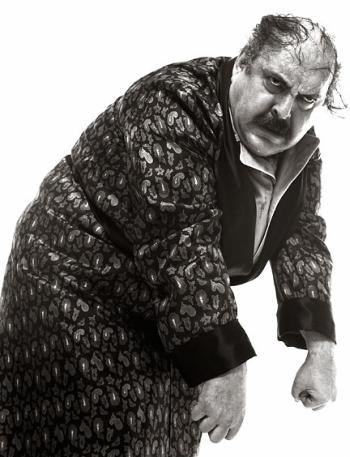
Zero Mostel
1961 production of
Rhinoceros
Eugène Ionesco
b. November 26, 1909
_______________________
Nose to nose with Laurence Sterne and Tristram Shandy
Karen Harvey
(....)I had simply not ‘got’ Tristram Shandy when I read it as a teenager. Ironically, I recall my overriding response as impatience: I just wanted the author to get on with the story. Returning to the novel years later I had an epiphany. I was working on a large project about men and the eighteenth-century home, reading the vast array of documents written by men in their domestic spaces, documents about themselves, their families, their histories, their houses, and a store of miscellaneous topics. Wasn’t this what Tristram was struggling to do?
...(more)
_______________________
Every day for at least ten years together did my father resolve to have it mended—'tis not mended yet;—no family but ours would have borne with it an hour—and what is most astonishing, there was not a subject in the world upon which my father was so eloquent, as upon that of door-hinges.—And yet at the same time, he was certainly one of the greatest bubbles to them, I think, that history can produce: his rhetorick and conduct were at perpetual handy-cuffs.—Never did the parlour-door open—but his philosophy or his principles fell a victim to it;—three drops of oil with a feather, and a smart stroke of a hammer, had saved his honour for ever.
—Inconsistent soul that man is!—languishing under wounds, which he has the power to heal!—his whole life a contradiction to his knowledge!—his reason, that precious gift of God to him—(instead of pouring in oil) serving but to sharpen his sensibilities—to multiply his pains, and render him more melancholy and uneasy under them!—Poor unhappy creature, that he should do so!—Are not the necessary causes of misery in this life enow, but he must add voluntary ones to his stock of sorrow;—struggle against evils which cannot be avoided, and submit to others, which a tenth part of the trouble they create him would remove from his heart for ever?
By all that is good and virtuous, if there are three drops of oil to be got, and a hammer to be found within ten miles of Shandy Hall—the parlour door hinge shall be mended this reign.
Laurence Sterne – The Life and Opinions of Tristram Shandy, Gentleman
(Chap. 2.14)
_______________________
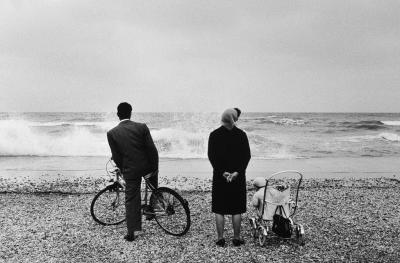
Gianni Berengo Gardin
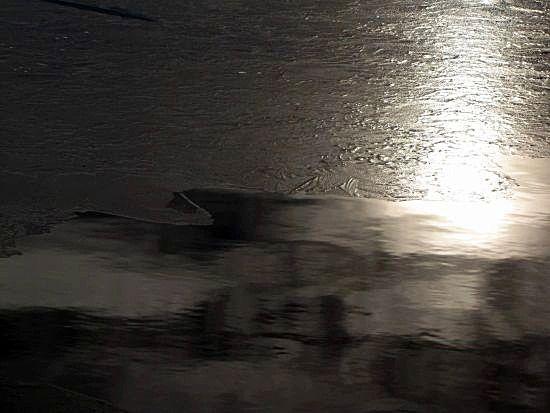
photo - mw
_______________________
Ad nauseam
The more we hate it, the more it agrees with us. How advertising turned anti-consumerism into a secret weapon
Adam Corner
aeon
(....)Corporate advertising is the ultimate shape-shifter; the perpetual tease. No sooner had the virulently anti-capitalist 'Occupy Wall Street' movement begun than the American rapper Jay Z's clothing label created and marketed an 'Occupy All Streets' spin-off T-shirt. But as citizen cynicism has advanced, the space in which advertising can operate without tripping on its own rhetoric has become ever more restricted, and ever more bizarre.
(....)
Satire has long been acknowledged as a paradoxical crutch for a society's existing power structures: we laugh at political jibes, and that same laughter displaces the desire for change. As such as Chipotle's - which express our concerns about the failings of globalisation in a safe space before packing them away - are surely an equivalent safety valve for any subversive rumblings. We all like to think that we're above the dark art of advertising; that we are immune to its persuasive powers. But the reality is that, though we might have been immunised, it is not against ads: it is against dissent.
...(more)
_______________________
Deconstructing The Demiurge: Eschatology of Reason
"The Gilded Index of Far-Reaching Ruin"
Carlo Parcelli
FLASHPOINT
I: A Brief Course in Secular Eschatology
In this rift,
Among these books towering above me
The war between Heaven and Hell rages.
To some by their very substantiation,
Heaven and earth were unified.
“But they were wrong.”
The mind fractures and
Ancient fault lines are manifest,
The body and blood,
Dionysus, Orpheus, the Prophet and
The apocrypha of Alkan crushed by his Talmud.
Or like Charles-Valentin-- Gillespie, Parker and Charlie Christian,
The free masonry of be-bop, its
Insurmountable technical problems
Designed to damn the poser,
The Skull and Bones of flatted fifths.
Lord, I am the scourge of human engineering. Hear my taunt.
Mostly it’s a Te Deum to tedium,
But then the tree line lit up so close
We took mud and bone incoming.
And ever since some go in and out;
Some came back with a vestigial tail.
Some were taken up meek and treacly.
But most are bitter and abandoned.
And a very few angry and dogged.
Next to plastic jugs of mixed nuts, adrenal,
Diving from the strobe of a ceiling fan,
Regrouping at the rows of Mossbergs and BARs pointed heavenward,
Laying down cover,
Keeping the angels pinned down behind the cumulus
While I make my getaway.
High noon in the big box store
Scattered among the pixelations on the High Def TV
Sucked toward the white light beyond, thinking, Kyrie Eleison,
Will they have their way and pixelate me?
“Mam, my arm. Touch my arm! Please, mam, TOUCH ME!”
Carbatrol, depakote, klonopin, lampictal, risperdal,
Topamax, thorazine, lithium, tofranil, seroquel;
Ten miracle drugs
For every one miracle in the bible,
For every sustainable superstition.
Transubstantation works for loaves and fishes, bread and wine,
Snakes and sticks, even Lazarus;
When Christ deejayed and catered Canaan,
Did he collect dove droppings
For his nanobox off the copper roof
At the Roman Legion’s gymnasium and wedding hall,
Because, shit to sangria, that Nazarene kid has kept that party hopping?
...(more)
_______________________

In conjunction
1886
Konstantin Korovin
_______________________
Poetry isolation and collective clumsiness
An antonymic exploration
Maria Damon
jacket2
“Poetry Communities and THE Individual Talent” — if THE individual talent is that of T. S. Eliot, then why am I here? If including the definite article is not intended by the conference organizers to actually describe anyone or anything, I can be more comfortable, but in general the antonymic is my preferred mode: isolation instead of community, collectivity instead of individuality, and clumsiness instead of talent. But “collectivity” doesn’t quite do it; it’s too purposeful and suggests focused endeavor. It might be more interesting to consider a surround of creativity, or uncreative, haphazard, epiphenomenal creativity, an environmental aura of spasmodic restlessness without clear agency, as a model for a poetics that erodes any lingering traces of Eliotic attachment to talented individualism. Although, it must be conceded that his wistfulness for disappearance into a personality-less tradition — albeit because of his overwhelming sense of personality — resonates with Michel Foucault’s (and John Keats’s and Jack Spicer’s) observation that the writer disappears into writing.
“Tradition,” by which Eliot meant the Western literary canon, has been wisely reconceived here as the folksier and pluralized “poetry communities.” There are, indeed, traditions comprising paraliterary heritage, but they are largely anonymous and hence more interesting. But the individual talent? The invidious talon? The toxic infection? Talent’s etymology alone qualifies it for suspicion, as its travel from weight to currency to penchant to giftedness solidly implicates it in the world of commodities, while Eliot’s use of the word as metonymic for “person” or “poet” overdetermines its status as alienated labor, an extraction of one appealing and desired resource from the “standing-reserve” of the populace in exchange for prestige, professional advancement, reification as a name, and so forth.
Why resurrect this embodiment of an outmoded literary ambition almost half a century after Foucault wonders whose multiple and anonymous murmurs waft him downstream on the history of discourse?...(more)
_______________________

"On the Oka"
1892
Konstantin Korovin
b. November 23, 1861
_______________________
Leaves: and their uses as nonsense
Barbara Maloutas
Aufgabe #3
(...)
Leaves and their uses as multiples joined:
The use of thorns, grass stalks or other methods of joinery (such as water) are
necessary but not often lasting.
Joining may produce linear or specific and shapeless flats
Shapeless flats present the least distinction and may be mistaken as native
Specific flats can be extremely intrusive
Considerations of a new place and where touch begins
The craft can be learned and refined – with patience – over years
Assistance happens:
Reasonable speed is vital. Helpers are essential. Once acquiring a reputation,
these are easy to gather. There will be many who wish to be part of a record or
trace of nature. There remains the question of whether an end is ever an end.
A good camera is essential:
The single way to acquire a reputation (and therefore a name), is through
recording projects from beginning to end or the end of recording.
A presence in the frame during recording is not essential
There is no other frame
Editing shapes the narrative
This is not about narrative
(....)
_______________________

photo - mw
_______________________
The Conservatives’ treatment of veterans is hypocritical
Gerald Caplan
If the politics of contempt is the hallmark of Stephen Harper’s governing style – for Parliament, for accountability, for critics, for science, for journalists – nothing is more shameful than its contempt for Canada’s veterans. It’s not merely that vets have won the right to so much better. It’s also the flat-out hypocrisy, the unbridgeable chasm between the Harper government’s rapturous rhetoric and its actual policies.
...(more)
_______________________
Canada’s real international shame — and it’s not Ford
Tony Burman
(....)
The Rob Ford scandal has been a genuine black eye for Canada. His continuing presence on the political scene is as mystifying to foreigners as it is embarrassing to Canadians. But one day, thankfully, Ford will be gone.
In a variety of areas including climate change, the damage being done by the Harper government to Canada’s global reputation is a stain that will stay with us for much longer.

A Georgian Epiphany
Lado Pochkhua
Poemas Del Rio Wang
"The photographs of the series “Anatomy of the Georgian Melancholy” (1993 – 2004) were taken while living in Tskneti, a suburb of Tbilisi where refugees had settled after escaping the war in Abkhazia: at the time, Lado Pochkhua was learning English from a copy of Robert Burton’s Anatomy of Melancholy."
_______________________
That which cannot be said must be passed over in silence:
thoughts on setting Thomas Bernhard to music
Adam Donen
My introduction to the author whose work would destroy a year and a half of my life, and will most likely poison many years more, began the evening of a horrific party filled with so-called artists of the sort with which London is littered. Yelling drunken inanities and clumsily attempting to lure each other to beds, dozens of them swarmed around the warehouse in which, back then, I made my home. “Listen to them,” I yelled, gesticulating at a half dozen or so sat opposite me, “sitting there in their wrongness, being wrong.” My interlocutor, a German journalist whose presence at the party remains a mystery to this day, presented me with a copy of Thomas Bernhard’s Holzfällen the next day. And so it began.
“All of the decrepit garbage of this totally decrepit European civilization, or rather, to hold nothing back, this totally decrepit modern world of ours, this era that keeps grinding out nothing but intellectual muck and all this stinking constipating clogging intellectual vomit is constantly being hawked in the most repulsive way as our intellectual products though it is in fact our intellectual waste products…”
Months later I found myself in a quandary. Put it this way: imagine you have a feeling that bears expressing. As with all feelings, words can at best render it imperfectly. Through metaphor and juxtaposition, you could, perhaps, render it obliquely, creating a map to the feeling with its scale different for each reader. Or else you could render it scientifically, describing its effects while hammering out any trace of its essence.
Here’s another scenario. If you’re Thomas Bernhard, crushed by the misfortune of having studied music alongside a genius (Glenn Gould), you could, at least, try to get words to come as close to music as ever they have.
And if you find yourself, as I did, thirty years after Bernhard’s death, trying to create orchestral music (“serious music”, as its rather wonderfully rendered in the German-speaking world), you might find yourself – for a variety of reasons – wanting to complete that translation back from words to music. What emerged would become my recently performed piece The Bernhard Suite. But more on that later.
...(more)
Wave Composition
_______________________

first ice on the Rideau
photo - mw
_______________________
Avant-Garde in Crisis
Roberto Tejada
lana turner
(....)
In one important sense, modernism cast a spell to fix the future at an endpoint: our relationship with the present is a process beholden to the past. Sweeping transformations today in the wake of global finance capital, intensified displacement, greater high-speed communication networks, and reverberating effects of these experiences on labor and value, have all but eroded the developmental time frame of modernism and its understanding of scale. To be sure, this ongoing historic process has yielded increasingly site-specific environments of impact and evaluation; and in these locations it has modified concrete and potential economies of imagined cultural status. If the modernist project and capitalism continue to associate as a shared repertoire of aspirations, certain cheerful inflections of avant-garde practice today appear so untroubled as to largely ape or disregard the symptoms of these deep-seated social transformations—and the role of the United States in that process. This omission speaks of a modernism complicit with “the long line of capitalist accumulation methods [that have] eventually exhausted its potential: once more capitalism, in the course of its expansion, has eaten up the milieu indispensable for its survival.”[i] In this scenario, modernist methods for producing critical antagonism are readily subsumed as just another carefree aesthetic consumer choice. Why not? If the crisis of the avant-garde is commensurate with the global downturn, with the perverse logic of credit boom and bust, then admission into the cultural marketplace is jeopardized by the expanding numbers thought to guarantee the cultural benefit of a few. In brazen pursuit of immediate gratification, how many advocates of formal innovation risk losing sight of modernism’s critical reason for being?
There is a vast range of poetic practices that so work in tandem with other forms of knowledge as to provide contradictory pleasures that also hazard a diagnostic. ...(more)
_______________________
 Fujiyama
Felice Beato
(1832 – 1909)
_______________________
Counter-commodification:
The economy of contribution in the digital commons
Andreas Wittel
Culture and Organization, 2013 Vol. 19, No. 4
abstract
This is an article about digital production and the crisis of capitalism. It is about production in the digital commons and its implications for the building of alternatives to a commodified world. As digital production is at the very heart of cognitive capitalism, the digital commons is not just any other disruption of the process of commodification. This is the field of a fierce struggle over the future of the Internet and the future of capitalism itself. It is potentially the moment which moves back the frontiers of measurement, value and quantification towards qualities, values and an expansion of the gift economy. For this potential to unfold, it is vital that those who are giving, sharing, and contributingfor the benefit of humanity are supported by global policies that enable them to do so. They have to be supported because their gifts are not based on reciprocity and the obligation to return the gift. This is an argument about the future of digital labour. The article concludes that this could be achieved through a global basic income scheme.
_______________________
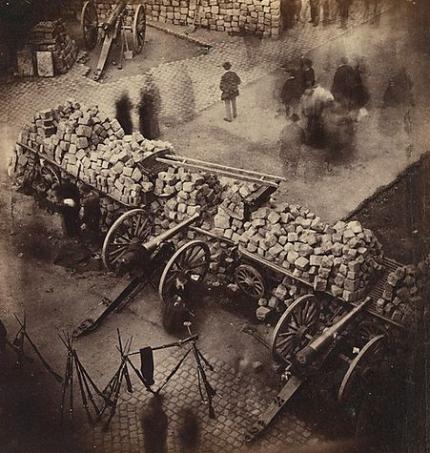
Barricades of the Commune
April 1871
Pierre-Ambrose Richebourg
1810-1893
_______________________
The $10 Trillion Heist
The Great Corporate Tax Shift
Jack Rasmus
The great corporate myth-making machine has been hard at work of late, attempting to create the false impression that US corporations are increasingly uncompetitive with their foreign rivals due to the fact they pay much higher corporate taxes in the US and abroad than their capitalist counterparts. But that is one of the great myths perpetrated by corporate apologists, pundits and their politician friends. The myth is high in the pantheon of conscious falsifications their marketing machines feed the American public, right up there along with such other false notions that 'business tax cuts create jobs', 'free trade benefits everyone', 'income inequality is due to a worker's own low productivity contribution', 'overpaid public workers are the cause of states' budget deficits', or that 'social security and medicare are going broke'.
If corporate America can create and sell the idea that they pay more taxes than their offshore capitalist cousins, then they are half way home to getting their paid politicians to provide them still more corporate tax cuts-a proposal by the way that both Republicans and Obama are on record for, in their joint proposal to reduce the top corporate tax rate from 35% to 28% (Obama) or 25% (Republicans).
...(more)

David Plowden
1 2 3
_______________________
Helplessness
Ewa Lipska
Translation by Robin Davidson & Ewa Elżbieta Nowakowska
The life which he was bequeathed
as grandma used to say
what kind of inheritance is that anyway?
He drags behind him days
He’d rather not have known.
A concentration-camp childhood.
Barbed-wire toys.
A suitcase from those days
airmailed
still pretends to be a bird.
He’s been living on borrowed time one might say
he’s managed to survive.
Till the end he will remain in his own
minority.
Who could make sense of that. Even God
asking for a light in the park’s mortgaged darkness
is just helplessness which turns to dust.
_______________________
The Data Surveillance State in the US and Europe
Joel Reidenberg
from the abstract
In each system, the elusive linkage between retention and access, the privatization of state surveillance activity, and flawed oversight for national security create extensive transparency of citizen’s data and undermine values of democracy including the presumption of innocence, the state’s monopoly on law enforcement, and the zone of individual freedom. In effect, government data surveillance law in both Europe and the United States has reached a turning point for the future of information privacy online. Three proposals can help to secure privacy that is necessary to preserve democratic values: stricter retention limits must be combined with stronger access controls; government access to personal information must be logged and transparent to citizens; and government officials must be personally liable for over-reaching behavior.
_______________________
The Logic behind Mass Spying: Empire and Cyber Imperialism
James Petras
_______________________
Three Paradoxes of Big Data
Neil M. Richards and Jonathan H. King
... we want to highlight three paradoxes in the current rhetoric about big data to help move us toward a more complete understanding of the big data picture. First, while big data pervasively collects all manner of private information, the operations of big data itself are almost entirely shrouded in legal and commercial secrecy. We call this the Transparency Paradox. Second, though big data evangelists talk in terms of miraculous outcomes, this rhetoric ignores the fact that big data seeks to identify at the expense of individual and collective identity. We call this the Identity Paradox. And third, the rhetoric of big data is characterized by its power to transform society, but big data has power effects of its own, which privilege large government and corporate entities at the expense of ordinary individuals. We call this the Power Paradox. Recognizing the paradoxes of big data, which show its perils alongside its potential, will help us to better understand this revolution. It may also allow us to craft solutions to produce a revolution that will be as good as its evangelists predict. _______________________

Turn Table detail
Bohstedt’s, Victor
David Plowden
1986
_______________________
A Splinter
Ewa Lipska
Translated by Robin Davidson and Ewa Elżbieta Nowakowska
I like you a twenty-year old poet writes to me.
A beginning carpenter of words.
His letter smells of lumber.
His muse still naps in rose wood.
Ambitious noise in a literary sawmill.
Apprentices veneer a gullible tongue.
They cut to size the shy plywood of sentences.
A haiku whittled with a plane.
Problems begin
with a splinter lodged in memory.
It is hard to remove it
much harder to describe.
Wood shavings fly. Laminate angels.
Dust up to the heavens.
thanks to flowerville
_______________________
The Dark Clown: Spectacle, charade and the Dark Politics of Rob Ford
Heather Morgan
Toronto Mayor Rob Ford is not an accident. He's not a car that suddenly lost control of the steering and veered off the road.
Ford doesn't only show us the flaws in Toronto's system of municipal governance. He shows us what the radical right has brought into politics.
Something that I will call Dark Politics. Political ideology that accompanies economic neoliberalism. Politics that seeks to obfuscate, misinform, change the rules of conduct and flourishes most when no light of truth is shone upon it.
...(more)
_______________________
Rob Ford, Stephen Harper, Addiction and Denial
Andrew Nikiforuk,
We are on the brink of becoming an indulged and stupefied citizenry willingly bullied by our leaders.
We are on the verge of losing our way as a resource-mining people just as surely as Rob Ford and Stephen Harper have lost their respective paths in an elaborate labyrinth of denials.
Harper and his political buddy Ford, Father of All Denialists, simply embody different sides of Canada's new political extremism.
...(more)
_______________________
Rob Ford’s mass appeal should frighten voters beyond Toronto city limits
Michael Den Tandt
(....)
Fordism is simply a very crass manifestation of techniques the Harper Conservatives have been employing, albeit with more elegance and discretion, for years.
(....)
We’ve seen Ford drunk, and we’ve seen him sober. For the sake of the nation, drunk is probably better. _______________________
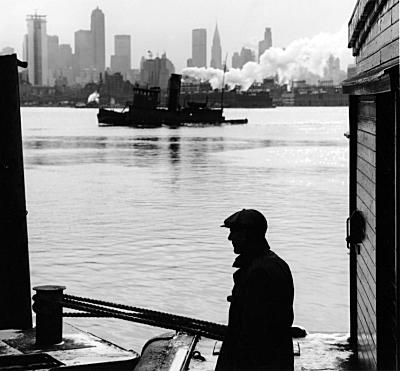
David Plowden
_______________________
Hannah Arendt
Ewa Lipska
translated by Clare Cavanagh
She.
Hannah Arendt
Euro City on the Heidelberg-Hamburg line.
Chronic love racing
through the docile squares of fields
through Europe’s lingering infection
evil’s simplicity.
He.
Martin Heidegger
the Führer of philosophy.
He’d be a train as punctual
as faith’s ambiguity.
March. March. Long-distance march.
The fanatical complexity of passing stations.
Vaterland
under predestination’s stretched sail.
They.
Hannah Arendt
Martin Heidegger
died
without regaining death.
New volunteers
now stand along the platform
calling on the evidence of their luggage.
They carefully unpack their ideologies,
drowned by the noise of an ontological excavator
philosophy’s adoptive aunt.
_______________________

David Plowden
_______________________
Rene Char
Translated by Colby Gillette
octopus
To The Residents Of The Sorgue
The space man, who was born today, will be a billion times less illuminating and will show us a billion times less hidden things than the granite-like man at Lascaux, who was shut up and put back to bed, his stiff limb clean of death. ...(more)
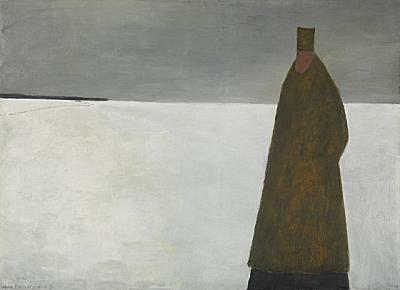
The Evening Visitor
Jean Paul Lemieux
(1956 )
_______________________
Sanatorium Under the Sign of the Hourglass
Bruno Schulz
(July 12, 1892 - November 19, 1942)
translated by Celina Wieniewska
(....)
That whole lumber room of ancient beauty has been subjected to a painful distillation under the pressure of years of boredom.
"Can you understand," my father used to ask, "the despair of that condemned beauty, of its days and nights? Over and over again it had to rouse itself to fictitious auctions, stage successful sales and noisy, crowded exhibitions, become inflamed with wild gambling passions, await a slump, scatter riches, squander them like a maniac, only to realize on sobering up that all this was in vain, that it could not get anywhere beyond a self-centered perfection, that it could not relieve the pain of excess. No wonder that the impatience and helplessness of beauty had at last to find its reflection in our sky, that it therefore glows over our horizon, degenerates into atmospheric displays, into these enormous arrangements of fantastic clouds I call our second or spurious fall. That second fall of our province is nothing but a sick mirage projected through an expanse of radiation into our sky by the dying, shut-in beauty in our museums. Fall is a great touring show, poetically deceptive, an enormous purple-skinned onion disclosing ever new panoramas under each of its skins. No center can ever be reached. Behind each wing that is moved and stored away new and radiant scenes open up, true and alive for a moment, until you realize that they are made of cardboard. All perspectives are painted, all the panoramas made of board, and only the smell is authentic, the smell of wilting scenery, of theatrical dressing rooms, redolent of grease paint and scent. And at dusk there is disorder and chaos in the wings, a pileup of discarded costumes, among which you can wade endlessly as if through yellowed fallen leaves. There is great confusion: everybody is pulling at the curtain ropes, and the sky, a great autumnal sky, hangs in tatters and is filled with the screeching of pulleys. And there is an atomsphere of feverish haste, of belated carnival, a ballroom about to empty in the small hours, a panic of masked people who cannot find their real clothes.
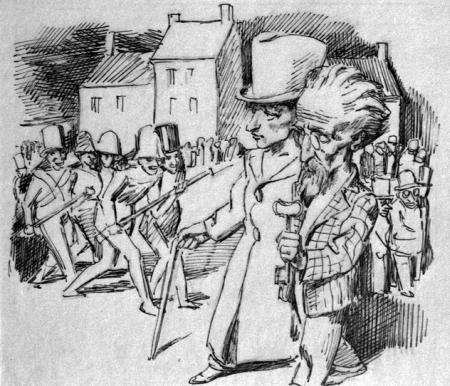
Father, Joseph, and terrorists
Bruno Schulz
1936
_______________________
A Second Autumn
Bruno Schulz
translated by John Curran Davis
Among the many scientific works undertaken by my father in his rare moments of quietude and inner equilibrium, between the bouts of disaster and catastrophe in which that audacious and boisterous life abounded, closest to his heart were studies in Comparative Meteorology, and particularly in the specific climate of our province, replete with its own singular kind of oddness. It was he, my father himself, who laid the foundations for a scholarly analysis of climatic formations. His "An Outline of the General Systematic of Autumn" explained once and for all the essence of that season, which adopts in our provincial climate that protracted, bifurcating, and parasitically exuberant form that, under the name of "Indian summer", extends far into the depths of our coloured winters.
What can I say? He was the first to explain the secondary, deriviative character of that late formation, which was nothing other than a peculiar poisoning of the climate by miasmas of the overripe and rancide baroque art crammed together in our museums. Decomposing in boredom and oblilvion, oversugared and locked in with no outlet, like old preserves, that museum art oversweetens our climate and is the cause of that beauteous, malarial fever, those colourful mirages in which that protracted autumn agonises. For beauty, my father taught us, is a disease. It is the chill of some mysteriouos infection, some dark announcement of decomposition rising from the depths of perfection, to be greeted by perfection with a sigh of the most profound happiness.
...(more)
_______________________
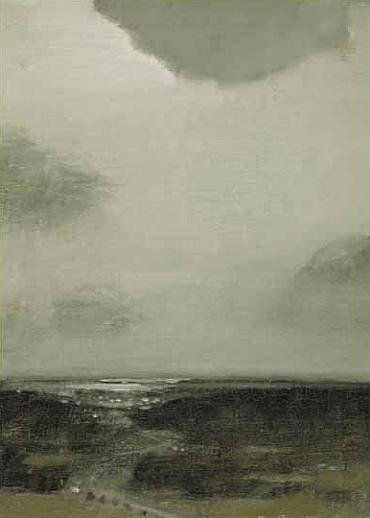
Le nuage
Jean Paul Lemieux
(18 November 1904 - 7 December 1990)
_______________________
From "Twenty Cloud Poems," 1-8
Jerome Rothenberg, with Arie Galles
Cloud Poem (7)
denial
where the winds rush
lifting bodies
like false clouds
from darkness
into light
& back
to darkness
...(more)
_______________________
Cloud in Trousers
Vladimir Mayakovsky
translated by Jonathan Brent and Lyudmila Sholokhova
Your thought,
dreaming on a softened brain
like a blown-up lackey on a greasy couch,
I’ll taunt with a bloody scrap of heart,
mock to my full, insolent and caustic.
Not one gray hair is in my soul,
no old man’s tenderness!
The world shakes from the might of my voice,
I go—a handsome,
twentytwoyearold.
Tender ones!
You put your love on violins.
The vulgar put love on kettle drums.
But to turn yourself inside out, as I,
and become nothing but lips
this you can’t do!
...(more)
_______________________

Doris Lessing
1919 - 2013
(....)
Some of Lessing's energy may have come from her outland origins: when the wheel spins, it's on the edges that the sparks fly. Her upbringing also gave her an insight into the viewpoints and plights of people unlike herself. And if you know you will never really fit in – that you will always be "not really English" – you have less to lose. Doris did everything with all her heart, all her soul, and all her might. She was sometimes temporarily wrong, as in the matter of Stalinist communism, but she never hedged her bets or pulled her punches. She went for broke.
If there were a Mount Rushmore of 20th-century authors, Doris Lessing would most certainly be carved upon it. Like Adrienne Rich, she was pivotal, situated at the moment when the gates of the gender disparity castle were giving way, and women were faced with increased freedoms and choices, as well as increased challenges.
... she was a model also for every writer coming from the back of beyond, demonstrating – as she so signally did – that you can be a nobody from nowhere, but, with talent, courage, perseverance through hard times, and a dollop of luck, you can scale the topmost storyheights.
Margaret Attwood
_______________________
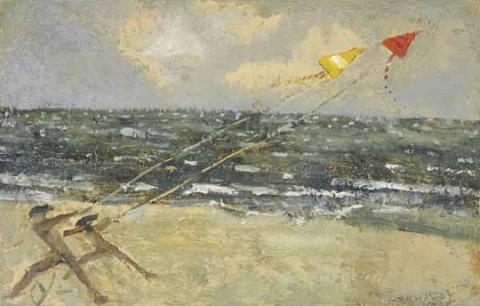
La plage
Jean Paul Lemieux
1977
_______________________
The Mythologization of Reality
Bruno Schulz
Translated by John M. Bates
(....)
Poetry is the short-circuiting of meaning between words, the impetuous regeneration of primordial myth.
When we employ commonplace words, we forget that they are fragments of ancient and eternal stories, that, like barbarians, we are building our homes out of fragments of sculptures and the statues of the gods.
(....)
The human spirit is tireless in its glossing of life with the aid of myths, in its 'making sense' of reality. The word itself, left to its own devices, gravitates towards meaning. Meaning is the element which bears humanity into the process of reality. It is an absolute given. It cannot be derived from other givens. Why something should appear meaningful to us is impossible to define. The process of making sense of the world is closely connected with the word. Speech is the metaphysical organ of man. And yet over time the word grows rigid, becomes immobilized, ceases to be the conductor of new meanings. The poet restores conductivity to words through new short-circuits, which arise out of their fusions. The image is also an offshoot of the original word, the word which was not yet a sign, but a myth, a story, or a meaning.
...(more)
_______________________
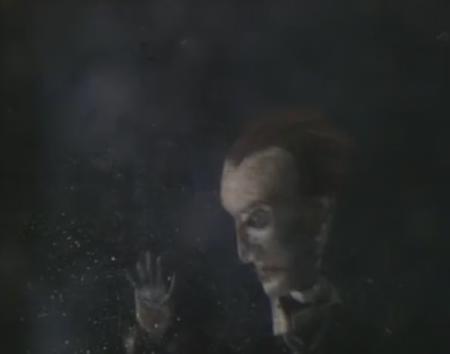
Street of Crocodiles
Brothers Quay
1986
youtube
|

































